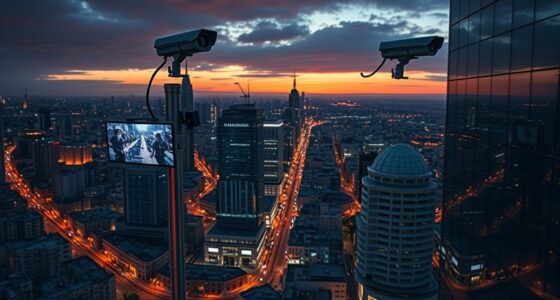In doomsday scenarios, using AI, drones, and autonomous systems ethically means balancing security with privacy and societal values. You should guarantee transparency, accountability, and clear guidelines to prevent misuse, bias, or harm. Protect civil liberties by limiting surveillance and data collection during crises. International cooperation is crucial to establish regulation and safeguards. Staying aware of these principles helps you navigate complex ethical challenges — continue exploring to learn how to implement responsible tech during emergencies.
Key Takeaways
- Implement transparent algorithms and ethical frameworks to ensure AI and drones align with moral standards during crises.
- Establish accountability measures assigning responsibility for autonomous system failures to prevent blame-shifting.
- Enforce strict privacy regulations and oversight to protect civil liberties amid increased surveillance and data collection.
- Develop international treaties and shared safety protocols to ethically regulate emergency technologies across borders.
- Conduct regular audits and community engagement to maintain transparency, fairness, and public trust in crisis tech deployment.
The Role of Artificial Intelligence in Crisis Management
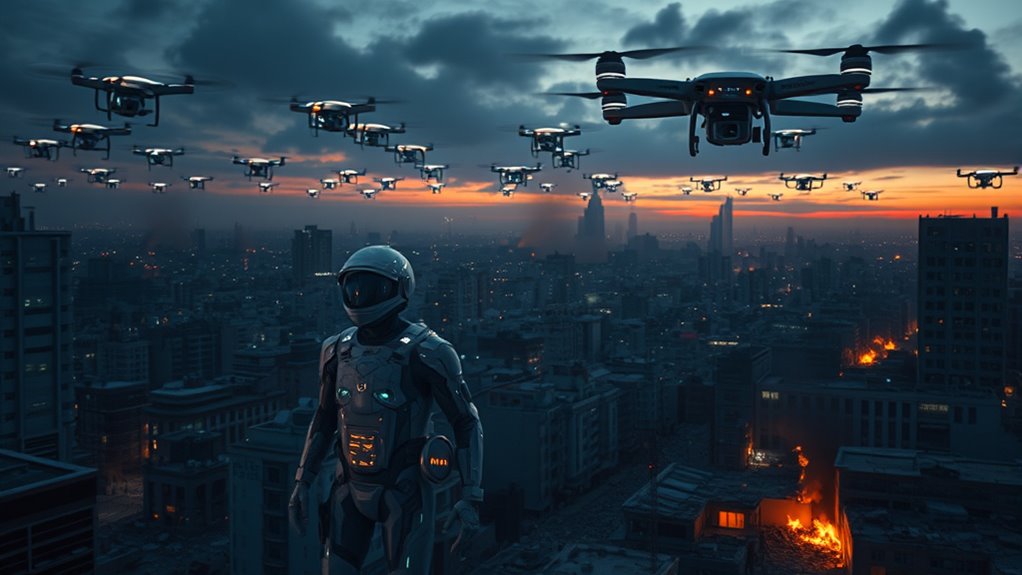
How can artificial intelligence transform crisis management? AI offers rapid data analysis, helping you respond more effectively to emergencies. However, AI bias can skew results, potentially leading to unfair or harmful decisions. To guarantee ethical use, decision transparency becomes essential—you need to understand how AI reaches its conclusions. Transparent algorithms allow you to identify biases and correct them, maintaining fairness during critical moments. Algorithmic fairness is crucial for equitable decision-making in high-stakes situations. By prioritizing clear decision-making processes, you can trust AI to support your efforts without compromising ethical standards. As you integrate AI tools, remember that transparency isn’t just a feature—it’s a safeguard. It ensures your crisis responses are accurate, fair, and aligned with ethical principles, ultimately enhancing your ability to protect and serve during emergencies. Incorporating ethical considerations in AI deployment helps ensure responsible and trustworthy crisis management. Additionally, adhering to established safety standards ensures that AI systems are reliable and reduce risks during deployment in sensitive scenarios. Moreover, ongoing security measures are vital for safeguarding AI systems from adversarial attacks that could undermine their integrity. A comprehensive approach to system monitoring further ensures continuous ethical performance and accountability.
Drones and Surveillance: Balancing Security and Privacy

Drones and surveillance technologies have become essential tools for enhancing security, but they also raise significant privacy concerns. With the drone proliferation, privacy erosion becomes a real threat, as constant monitoring can intrude on personal freedoms. To balance security and privacy, you should consider:
Drones boost security but pose privacy risks; careful regulation is essential to protect personal freedoms.
- Implementing strict regulations on drone usage and data collection
- Ensuring transparency about surveillance practices
- Establishing clear boundaries to prevent overreach
- Promoting awareness about for sale 100 policies and rights related to surveillance
While these tools help detect threats and maintain safety, unchecked drone proliferation risks infringing on individual rights. Striking a balance involves weighing security benefits against privacy costs, and continuously updating policies to adapt to technological advances. By doing so, you can help prevent privacy erosion while still safeguarding communities effectively.
Ethical Frameworks for Decision-Making in Catastrophic Events

In the face of catastrophic events, ethical decision-making becomes critical to guarantee that actions taken are just and responsible. You’ll face moral dilemmas, such as choosing between saving the greatest number of lives or prioritizing vulnerable groups. Ethical frameworks, like utilitarianism or deontology, guide these tough choices by providing principles to evaluate consequences and duties. Resource allocation is a core challenge; you must determine how to distribute limited supplies, medical aid, or technology fairly. These frameworks help you balance competing interests, ensuring transparency and consistency. When decisions could affect millions, adhering to a clear ethical structure ensures actions remain just, even in chaos. Considering AI security and the potential risks associated with autonomous decision-making systems can also inform decisions about resource prioritization and health interventions during crises. Incorporating ethical guidelines specific to emergency scenarios can further support decision-makers in maintaining moral integrity under pressure. Additionally, consulting established trustworthiness of Patchology principles can serve as a model for transparency and integrity in high-stakes decision-making. By applying these decision-making tools, you can navigate moral dilemmas with integrity during times of crisis.
Accountability and Responsibility in Autonomous Systems
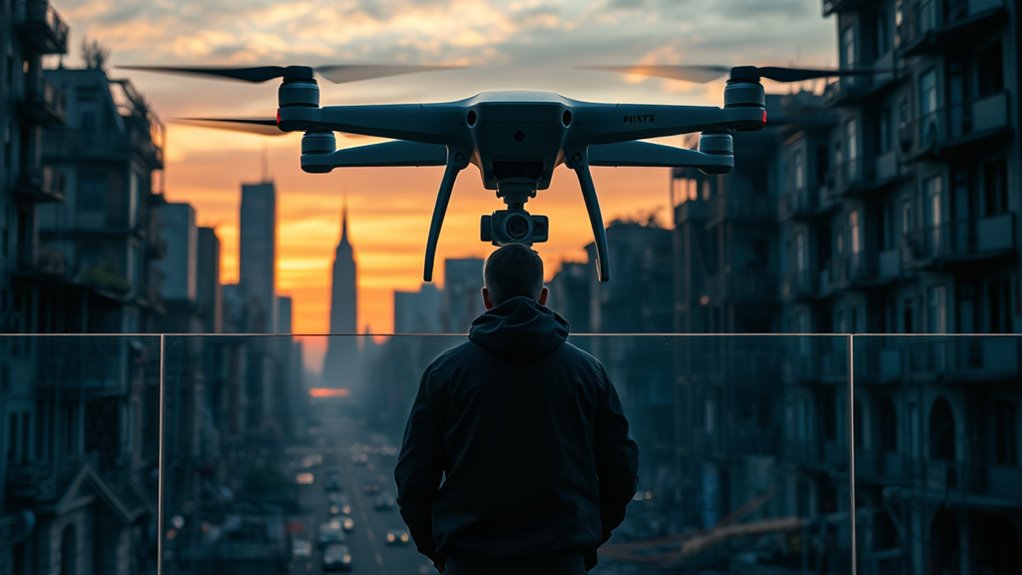
As autonomous systems become more integrated into critical decision-making processes, establishing clear accountability and responsibility is essential. You need robust cybersecurity protocols to prevent malicious interference and guarantee system integrity. Ethical AI design is vital for guiding autonomous actions aligned with moral standards, reducing unintended harm. When failures occur, you must identify who’s responsible—whether developers, operators, or manufacturers—and ensure transparent reporting. Regular audits and updates help maintain accountability. Consider these key points:
- Implement cybersecurity protocols to safeguard autonomous systems against cyber threats.
- Prioritize ethical AI design to embed moral considerations into system behavior.
- Clarify responsibility chains to address failures and prevent blame-shifting.
- Incorporate system testing and validation to ensure autonomous systems perform reliably and ethically.
Protecting Civil Liberties During Societal Collapse
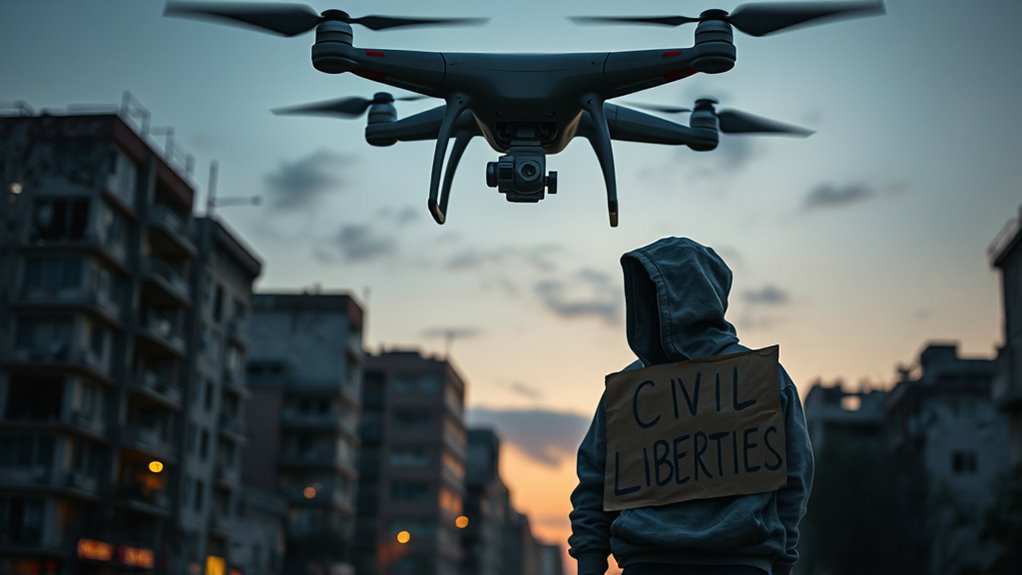
During societal collapse, you need to consider how to limit surveillance to protect privacy while maintaining safety. Ensuring due process rights remains crucial, even in chaos, to prevent abuses of power. Building and maintaining community trust becomes essential to uphold civil liberties and prevent further harm. Incorporating mindfulness techniques can help communities stay centered and resilient during crises, fostering emotional stability and collective well-being.
Surveillance Limits During Chaos
When society faces chaos, maintaining strict surveillance can quickly erode fundamental civil liberties. During such times, the risk of privacy erosion and data misuse surges, threatening individual freedoms. To protect civil liberties, you should consider these limits:
- Implementing oversight to prevent unchecked data collection
- Establishing clear boundaries on surveillance scope
- Ensuring transparency about how data is used
- Regularly reviewing privacy policies to adapt to evolving circumstances
Without these safeguards, you risk enabling authorities to overreach, infringing on personal privacy and enabling misuse of sensitive information. While surveillance can aid security, it’s crucial to strike a balance that preserves civil liberties. Setting limits during chaos helps prevent the normalization of intrusive practices, ensuring society’s core rights remain protected even amid upheaval.
Ensuring Due Process Rights
How can we guarantee that due process rights remain protected even when societal order breaks down? Maintaining digital sovereignty is essential, so individuals retain control over their personal data and legal protections. Implementing transparent protocols for technology use ensures that rights aren’t overlooked amid chaos. Ethical hacking becomes crucial, allowing trusted experts to identify vulnerabilities in emergency systems before malicious actors exploit them. Clear guidelines for deploying AI and drones help prevent abuse and safeguard civil liberties. Even during societal collapse, preserving due process requires proactive measures—such as secure communication channels and accountability mechanisms—that uphold fairness and legal rights. Recognizing the importance of digital security protocols can also inform ethical decision-making during crises, ensuring that actions align with moral considerations. Additionally, understanding spiritual practices can foster resilience and community cohesion, which are vital during times of societal upheaval. Incorporating ethical frameworks rooted in philosophy and community values can further reinforce the protection of rights when societal structures falter. By prioritizing these strategies, we can protect individual freedoms and prevent rights from being sacrificed in times of crisis. Furthermore, fostering a culture of creative practice can promote innovative solutions to emergent challenges during societal breakdowns.
Community Trust Preservation
In times of societal collapse, maintaining community trust becomes essential to protecting civil liberties and ensuring coordinated resilience. You can foster social cohesion by transparent communication about tech use, respecting individual rights, and involving community members in decision-making. Prioritize:
- Building transparency around surveillance and data collection, including clear explanations of how information is gathered and used privacy safeguards. Recognizing that implementing trust-building strategies can enhance community cooperation and compliance. Open communication about community engagement initiatives helps foster understanding and collective responsibility. Incorporating technological literacy education can empower community members to better understand and oversee surveillance practices.
- Encouraging open dialogue to address concerns and fears, creating forums for community members to voice their opinions and get informed responses.
- Promoting inclusive practices that respect diverse voices, ensuring marginalized groups are not excluded from decision-making processes.
- Recognizing the importance of early detection and screening mammography guidelines to promote health awareness and prevent crisis-related health disparities.
The Impact of Data Collection and Privacy Erosion

As data collection becomes increasingly pervasive, your privacy faces steady erosion, often without clear consent or awareness. Every click, search, or location ping feeds a system that monitors your habits, preferences, and even thoughts. This relentless surveillance raises critical questions about data privacy and surveillance ethics. You might feel powerless, but awareness is your first defense. Consider the impact:
| Protecting Your Privacy | Risks of Data Loss |
|---|---|
| Control over personal data | Identity theft |
| Transparent data practices | Unauthorized surveillance |
| Informed consent | Loss of anonymity |
| Choice to opt out | Erosion of civil liberties |
This ongoing erosion threatens your autonomy and trust in technology, emphasizing the need for robust safeguards to prevent misuse and preserve individual rights. Understanding the differences between copyright and trademarks can also help you protect your digital creations and brand identity in this data-driven landscape.
International Cooperation and Regulation of Emergency Technologies
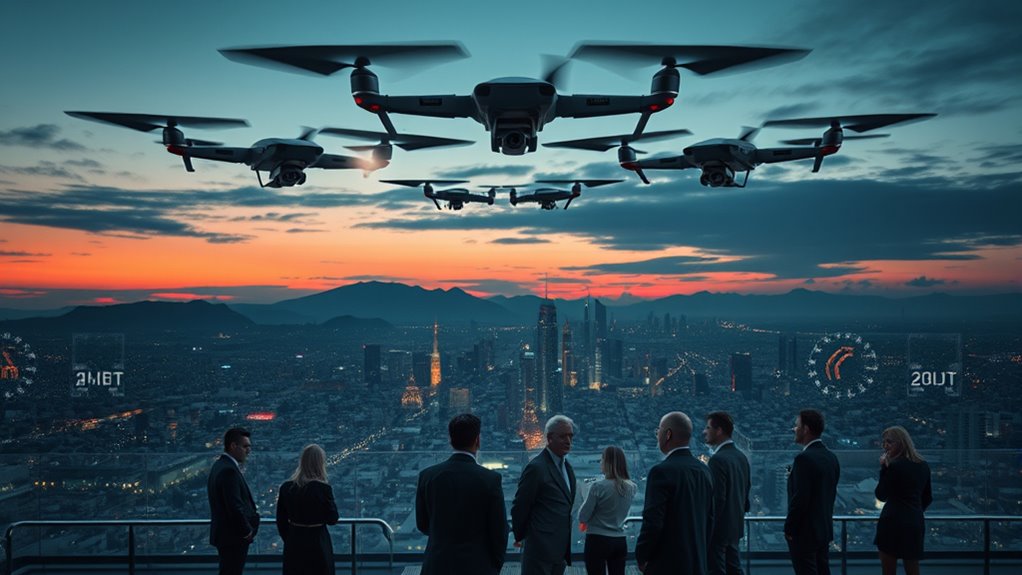
Have you ever considered how international cooperation is essential for regulating emergency technologies? In crises, global governance ensures that nations share responsibility, resources, and standards. Cross border collaboration helps prevent misuse and promotes ethical deployment of AI, drones, and other tools during emergencies. Effective regulation requires unified policies, transparent communication, and shared accountability.
Key aspects include:
- Establishing international treaties that set boundaries and safety protocols
- Coordinating rapid response efforts across nations
- Monitoring and enforcing compliance on a global scale
Without strong international frameworks, emergency tech risks misuse, escalation, or neglect of ethical considerations. Your role is to support global governance initiatives that foster cooperation, ensuring these powerful tools serve humanity ethically and effectively during doomsday scenarios.
Preparing Ethical Protocols for Technological Deployment in Doomsday Scenarios
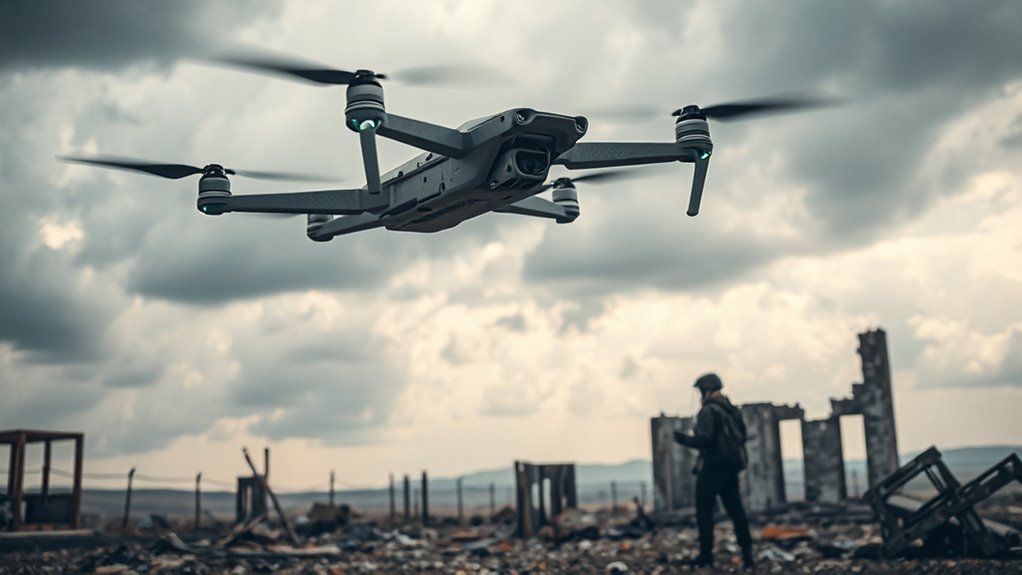
To responsibly deploy technology in doomsday scenarios, you need to establish clear ethical guidelines that prioritize human safety and moral considerations. You also must implement oversight and accountability measures to guarantee decisions remain transparent and responsible. These steps help you prepare protocols that balance innovation with ethical integrity in crisis situations.
Establish Clear Ethical Guidelines
Establishing clear ethical guidelines is essential when preparing for the deployment of technology in doomsday scenarios. Your guidelines should address key issues like privacy concerns and moral dilemmas, ensuring responsible use. Consider these critical points:
- How to balance individual privacy with safety priorities
- When to prioritize human judgment over automated decisions
- Managing transparency to build trust and accountability
Implement Oversight and Accountability
Implementing oversight and accountability is crucial to guarantee that technological deployment in doomsday scenarios remains ethically sound and socially responsible. You need to establish mechanisms that monitor algorithms for bias, ensuring decisions aren’t skewed or unjust. Transparency standards are essential so that stakeholders understand how technologies operate and make decisions, fostering trust and accountability. Regular audits help identify and correct algorithm bias, preventing unintended harm. Clear reporting channels allow for prompt addressing of issues, while oversight bodies ensure compliance with ethical protocols. By embedding these practices, you create a system that not only reduces risks but also promotes responsible innovation. Prioritizing oversight and accountability safeguards human rights and upholds societal values, even amid the chaos of doomsday scenarios.
Long-term Implications of Emergency Tech Use on Humanity

When emergency situations demand rapid deployment of technology, the long-term effects on humanity can be profound and unpredictable. Emergency tech, like genetic modification or planetary defense systems, can reshape society’s future. You might see enhanced human resilience, but also risks of irreversible genetic changes or misuse. These technologies could:
Rapid deployment of emergency tech can profoundly and unpredictably reshape humanity’s future.
- Alter human genetics, raising ethical concerns about consent and identity
- Enable planetary defense measures that protect or threaten global stability
- Create dependency on emergency systems, reducing resilience in normal times
While these innovations promise safety and survival, they also pose ethical dilemmas. You must consider how deploying advanced tech during crises influences our collective future and whether safeguards will keep humanity from unintended consequences.
Frequently Asked Questions
How Can Ethical Considerations Be Prioritized During Rapid Crisis Response?
During rapid crisis response, you can prioritize ethical considerations by guaranteeing algorithm transparency so decision-makers understand how data influences actions. Focus on moral decision making by establishing clear guidelines that balance urgency with ethical standards. You should also involve diverse stakeholders to evaluate potential impacts, making sure technology serves everyone fairly. This approach helps maintain accountability and ensures ethical principles guide critical decisions, even under pressure.
What Are the Potential Unintended Consequences of Deploying Emergency AI Systems?
Think of deploying emergency AI systems like walking a tightrope—you might get ahead of disaster, but unintended consequences loom. You could face algorithm biases that misjudge situations or compromise data privacy, turning aid into a double-edged sword. These systems might also make decisions too quickly for human oversight, causing chaos. It’s vital to contemplate these risks to prevent worsening the crisis instead of alleviating it.
How Can Marginalized Communities Be Protected From Surveillance Abuses in Crises?
You can protect marginalized communities from surveillance abuses during crises by actively engaging in community advocacy and promoting cultural sensitivity. Support policies that enforce strict oversight and transparency of surveillance tools, ensuring they’re not misused. Educate your community about their rights and the risks involved. Collaborate with local organizations to develop culturally sensitive safeguards, allowing vulnerable populations to maintain privacy and dignity even amidst emergency responses.
What Legal Frameworks Exist for International Accountability in Tech Misuse During Disasters?
Think of international accountability as a safety net woven from treaties and liability frameworks. These legal tools aim to catch those misusing tech during disasters. While treaties like the Geneva Conventions set standards, liability frameworks hold individuals and nations responsible. Yet, enforcement remains tricky across borders. You must stay vigilant and advocate for stronger, clearer laws that guarantee tech misuse during crises doesn’t go unchecked globally.
How Can Public Trust Be Maintained When Deploying Life-Saving Technologies?
To uphold public trust when deploying life-saving technologies, you should prioritize community engagement and transparency initiatives. Clearly communicate how these tools work, their benefits, and potential risks. Involving communities in decision-making processes helps build confidence and ensures ethical use. Regular updates and open dialogue demonstrate your commitment to accountability, fostering trust and cooperation during critical situations when technology’s role is essential for safety and survival.
Conclusion
As you navigate these urgent tech debates, remember that your choices shape our collective future. In moments of crisis, ethics aren’t just ideals—they’re survival tools. When technology acts as both shield and sword, your mindful decisions can prevent chaos from becoming catastrophe. Sometimes, it’s the smallest act of responsibility that preserves our humanity, proving that even in the darkest times, our integrity can light the way forward.






